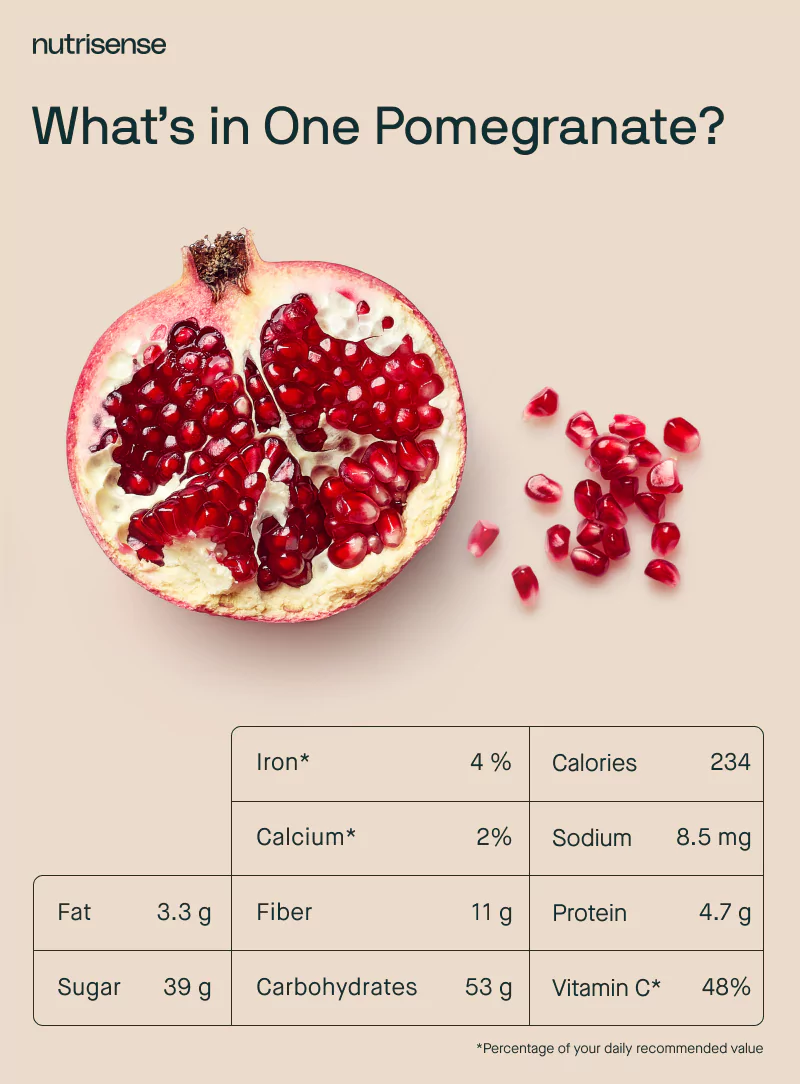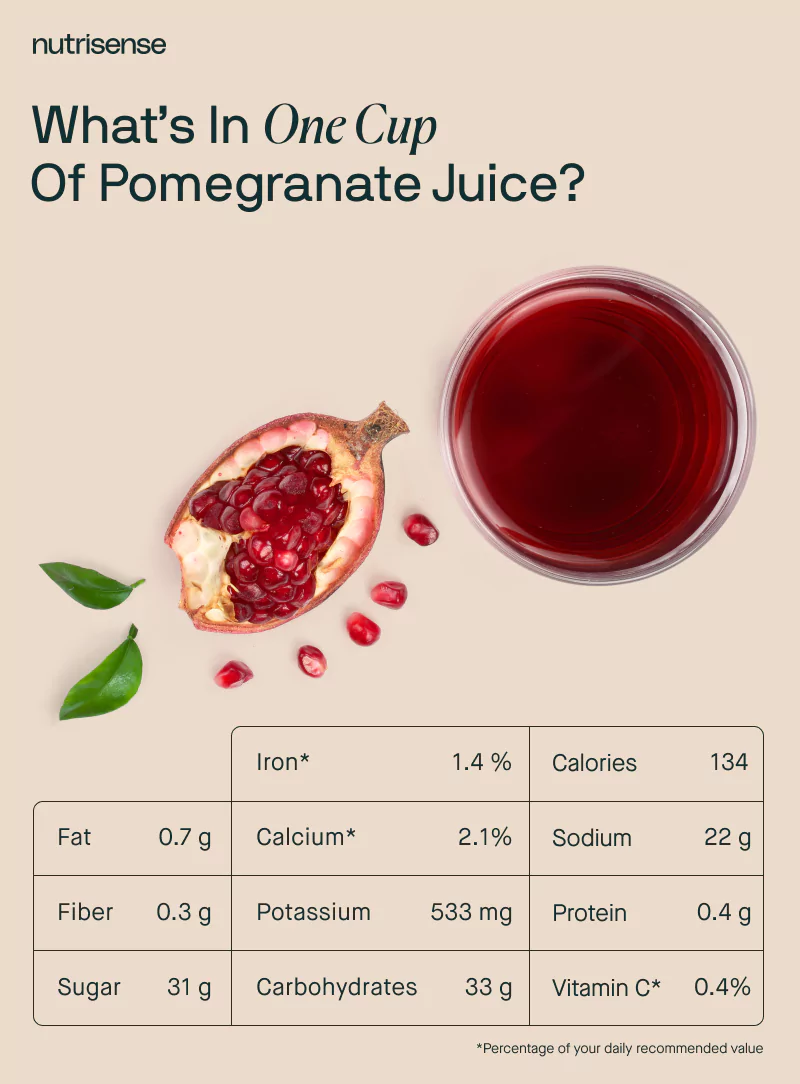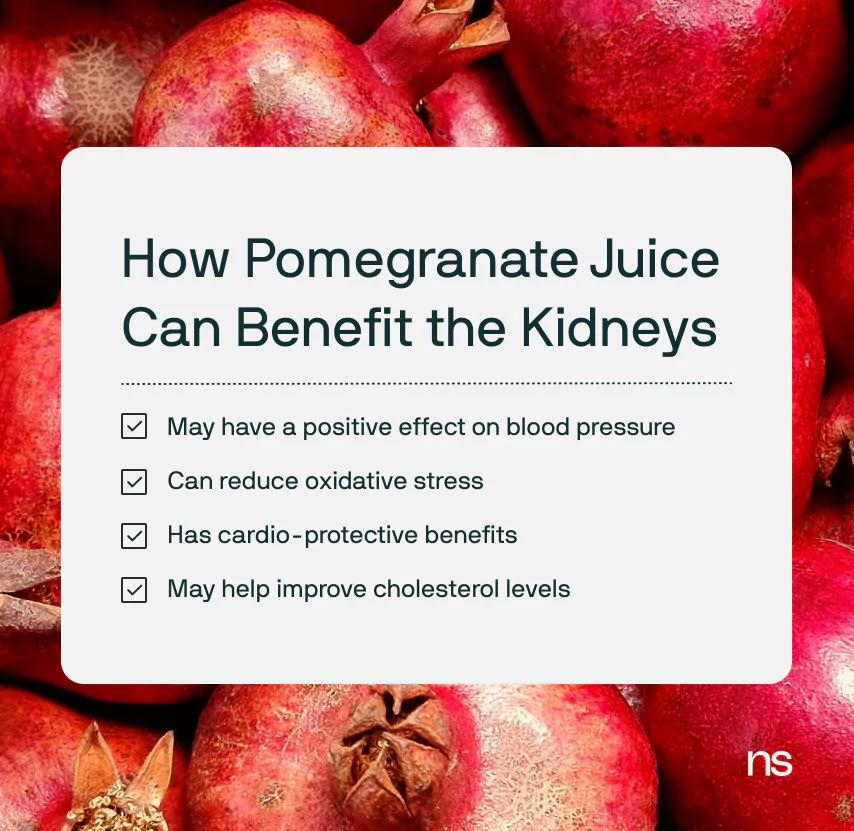Pomegranate Juice for Kidney Health: Is It Good for You?

Key Takeaways
Cranberry juice is often promoted as a natural remedy for urinary tract infections, and orange juice is what some have been told might help the common cold. But what about the possible benefits of pomegranate juice?
Pomegranates and their juice are known for their nutritional content and antioxidant properties, and studies have shown pomegranate juice may have several health benefits.
Should you start stocking up on pomegranate juice for your health? Does the sugar in pomegranate juice spike blood sugar? And how can pomegranates support kidney health?
Let’s dig in and find out.
Where Do Pomegranates Come From?
The most prominent growing regions for pomegranates are countries like Egypt, China, Afghanistan, Pakistan, and Iran. In the United States, this fruit is typically grown in the dry zones of California and Arizona.
Pomegranates have a tough, red skin and are filled with seeds. The seeds are surrounded by thin membranes that hold in tart, red pulp and juice. The seeds can be eaten whole, or pressed for their juice.
Pomegranate juice is the base for grenadine, a syrup used in cocktails. The juiced seeds can also be used to make pomegranate molasses, which is used widely in Middle Eastern cooking. In India, pomegranate seeds are dried and used as a spice, called anardana.
Nutritional Benefits of Pomegranates
Both pomegranate seeds and pomegranate juice are rich in nutrients and known for their antioxidant activity. What about the difference between pomegranate seeds and pomegranate juice? Read on to learn more.
Whole Pomegranates
One whole pomegranate contains the following:

Pomegranates are also full of potassium, a mineral needed for kidney, heart, and nerve function. One pomegranate contains 666 milligrams, or 19 percent of your daily value. Unlike pomegranate juice, pomegranates are also very high in fiber.
Pomegranate Juice
Pomegranate juice has a slightly different nutritional profile than pomegranate seeds. One cup of pomegranate juice contains:

The Role of the Kidneys in the Body
Your kidneys are two bean-shaped organs that are located just below your rib cage. They are part of your urinary tract, along with the bladder and ureters.
In the body, your kidneys are tasked with:
- Filtering your blood to remove waste and extra water
- Concentrating urine
- Balancing the water, salts, and minerals in your blood
- Making hormones that are involved in controlling blood pressure
- Converting vitamin D to its active form, calcitriol
- Producing red blood cells
High volumes of blood flow into the kidneys. These organs filter about half a cup of blood per minute.
The health of your kidneys can be damaged by high blood pressure, which is the second leading cause of kidney failure. Over time, high blood pressure can cause the arteries around the kidneys to narrow, weaken, or harden. Diabetes is also a leading cause of chronic kidney disease (CKD). About one in three adults with diabetes has CKD.
Pomegranate Juice and Kidney Health
So, can pomegranate juice be good for your kidneys? The answer depends on a few factors.
Studies show that pomegranate juice can have a positive effect on blood pressure, which in turn can have a positive effect on your kidneys. Other research has also suggested that pomegranate juice may benefit people on dialysis.
Dialysis treatment helps filter the waste and water from your blood, balance its minerals, and control blood pressure. Dialysis patients experiencing kidney failure may find that pomegranate juice can reduce inflammation while also having cardiovascular benefits.
People who already have chronic kidney disease may have a higher risk of heart disease. This is because when the kidneys don’t work properly, your heart has to work harder, putting it under stress that can lead to heart disease.

Research also shows that drinking pomegranate juice may improve cholesterol levels and blood pressure in people with type 2 diabetes. High cholesterol and high blood pressure levels are two risk factors for developing heart disease.
The antioxidants in pomegranate juice, like ascorbic acid and polyphenols, may also have a positive impact on heart health in people with kidney problems.
A recent animal model study showed that pomegranate juice may also be effective at alleviating the harmful effects of chronic heavy metal exposure on the kidneys. Researchers observed that pomegranate juice raised zinc levels in the soft tissues of rats.
Zinc is able to significantly neutralize some of the toxic effects of lead. However, more research is still needed to determine if these effects can translate into humans.
Can You Drink Too Much Pomegranate Juice?
One thing to keep in mind when it comes to pomegranate juice and kidney health is that too much potassium can be harmful to people with kidney disease.
Potassium is an important electrolyte that plays a crucial role in cardiovascular health. High potassium levels can be dangerous to your heart, leading to side effects such as an irregular heartbeat or even a heart attack.
When your kidneys cannot filter the excess potassium from your blood like they normally would, this causes it to build up in your bloodstream.
Kidney disease patients or anyone who is experiencing impaired kidney function should talk to a doctor or a registered dietitian before incorporating pomegranate juice into their diet.
Pomegranate juice also contains carbohydrates, which in higher amounts may increase blood sugar levels for some people. Poor glucose control increases risk for prediabetes and diabetes.
Health Benefits of Pomegranate Juice

Beyond their potential benefits on kidney health, pomegranates and pomegranate juice have been extensively studied for many health benefits.
Here are just a few of the other health benefits of pomegranate juice.
1) Good Source of Antioxidants
Pomegranate juice is full of antioxidants—it may have more antioxidant potential than green tea and red wine. The bioactive compounds in pomegranate juice, like anthocyanins, catechins, and polyphenols, have antioxidant and anti-inflammatory effects at certain dosages.
Pomegranate juice may help reduce oxidative stress, fight DNA-damaging free radicals, and lipid peroxidation, which causes damage to your cells.
2) May Lower Cholesterol
Studies show that the polyphenols in pomegranate juice may lower harmful LDL cholesterol levels and increase good cholesterol in your body. This may help prevent heart disease and other cardiovascular problems.
While this research is promising, more research is needed to definitively establish the effect of pomegranate juice on cholesterol.
3) Can Support Healthy Blood Pressure

Pomegranate juice may also be beneficial for healthy blood pressure levels. Animal studies have shown that pomegranate juice may be able to reduce systolic blood pressure.
Rats who drank 100 milligrams of pomegranate juice daily experienced:
- A 30 percent decrease in the thickness of their carotid arteries
- A 90 percent decrease in LDL oxidation
These are two major risk factors for hypertension. However, human studies still need to be done to determine if pomegranate juice can have the same effect on humans.
4) Can Reduce Inflammation
In one animal study, joint inflammation caused by rheumatoid arthritis in rats was significantly reduced by the administration of pomegranate extract.
This is likely due to pomegranate’s high polyphenol content, which can inhibit inflammatory activity in the body.
Does Pomegranate Juice Raise Blood Sugar?

Pomegranates and their juice contain natural sugars, which can be included as part of a healthy diet for most people. The American Heart Association recommends eating four servings of fruit per day. This may need to be adjusted further depending on the needs and carbohydrate tolerance of the individual.
In their whole form, pomegranates have a glycemic index of about 35. This means that they are considered to be a low GI food. Pomegranates also have a low glycemic load of 6.7, which takes into account the amount of a food you are likely to eat.
Whether or not pomegranate juice affects your blood sugar will likely be determined by the amount of it you drink and whether it contains added sugar. Opting for a brand of pomegranate juice with no added sugar and drinking it in moderation may be helpful for avoiding blood sugar spikes.
Studies have also found that some of the bioactive compounds found in pomegranate have anti-diabetic effects. The polyphenols in pomegranate juice, specifically, have been shown to reduce the postprandial glycemic response of bread and have longer-term positive effects on blood sugar metabolism.
If you are unsure whether pomegranate juice is safe for you to drink, talk to your doctor or a healthcare professional.
Find the right Nutrisense programto turn insight into progress.
Go Beyond Glucose Data with Nutrisense
Your glucose can significantly impact how your body feels and functions. That’s why stable levels are an important factor in supporting overall wellbeing. But viewing glucose isn't enough. Nutrisense, you’ll be able to learn how to use your body's data to make informed lifestyle choices that support healthy living.
One-to-one coaching
Sign up to access insurance-covered video calls to work with a glucose expert: a personal registered dietitian or certified nutritionist who will help tailor your lifestyle and diet to your goals.
Monitor and measure what matters
With the Nutrisense CGM Program, you can monitor your glucose with health tech like glucose biosensors and continuous glucose monitor (CGM)s, and analyze the trends over time with the Nutrisense App. This will help you make the most informed choices about the foods you consume and their impact on your health.
Find your best fit
Ready to take the first step? Start with our quiz to find the right Nutrisense program to help you take control.

Heather is a Registered and Licensed Dietitian Nutritionist (RDN, LDN), subject matter expert, and technical writer, with a master's degree in nutrition science from Bastyr University. She has a specialty in neuroendocrinology and has been working in the field of nutrition—including nutrition research, education, medical writing, and clinical integrative and functional nutrition—for over 15 years.


.webp)

